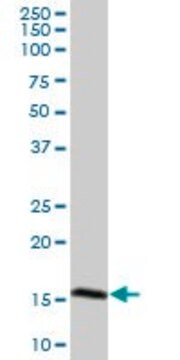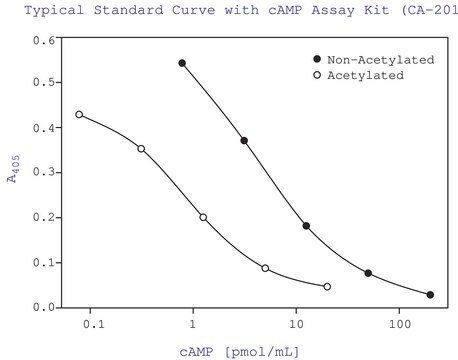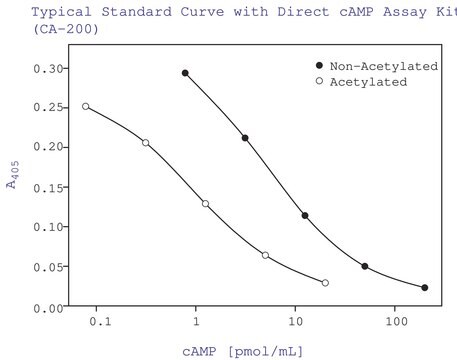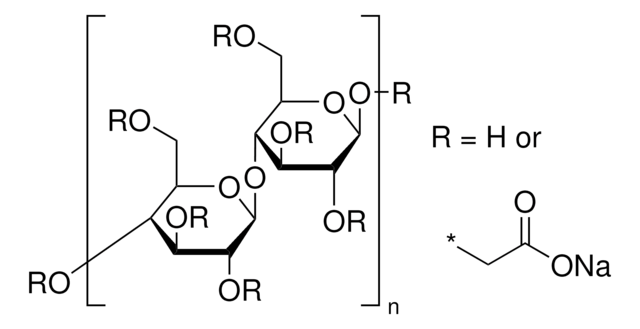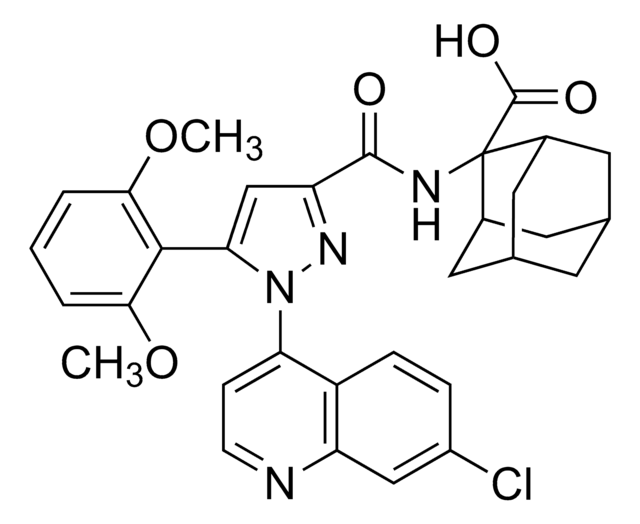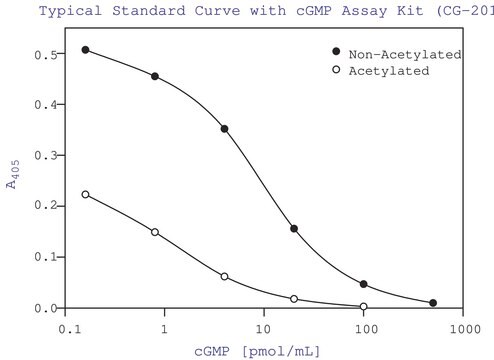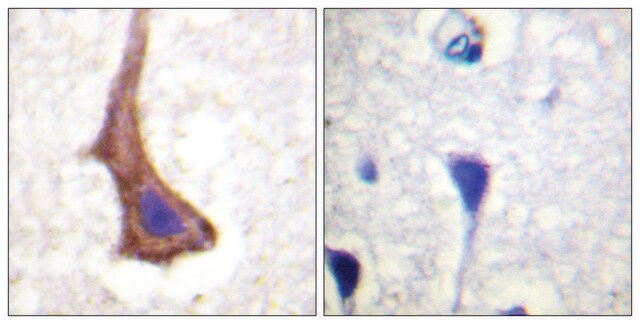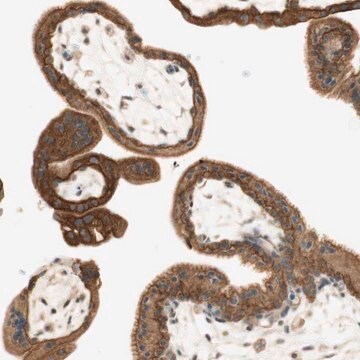Recommended Products
biological source
rabbit
Quality Level
antibody form
serum
antibody product type
primary antibodies
clone
polyclonal
species reactivity
rat
species reactivity (predicted by homology)
all
technique(s)
immunohistochemistry: suitable (paraffin)
shipped in
wet ice
target post-translational modification
unmodified
General description
Cyclic adenosine monophosphate or cAMP is an intracellular by-product of ATP by adenylene cyclase when G-protein Coupled Receptors (GPCR) bind various ligands on the cell surface. Cyclic AMP acts as a second messenger for signal transduction across the cell membrane and is a part of kinase activation. It regulates the effects of glucagon and adrenaline along with the movement of calcium ions through ion channels. Since it is affected directly by GPCR activation, cAMP is studied as a means to monitor GPCR in the discovery of therapeutic drugs.
Specificity
Specific for cAMP with no cross reaction to other nucleotides at concentrations to 1 mM. Reactive with cAMP fixed in tissues or acetylated cAMP. Not reactive with free, non-acetylated, cAMP in RIA or EIA assays.
Immunogen
2′O-succinyl cyclic AMP conjugated to BSA
Application
Anti-cAMP Antibody detects level of cAMP & has been published & validated for use in IH(P).
Research Category
Signaling
Signaling
Research Sub Category
GPCR, cAMP/cGMP & Calcium Signaling
GPCR, cAMP/cGMP & Calcium Signaling
Quality
Evaluated by Immunohistochemistry in rat hippocampus and cerebellum tissue.
Immunohistochemistry Analysis: 1:100 dilution of this lot detected cAMP in rat hippocampus and cerebellum tissue.
Immunohistochemistry Analysis: 1:100 dilution of this lot detected cAMP in rat hippocampus and cerebellum tissue.
Linkage
Replaces: MABN1026
Physical form
Diluted serum presented as liquid in PBS containing no preservatives.
Unpurified rabbit serum
Storage and Stability
Maintain at -20°C in undiluted aliquots from date of shipment. Avoid repeated freeze/thaw cycles.
Analysis Note
Control
Rat hippocampus and cerebellum tissue
Rat hippocampus and cerebellum tissue
Disclaimer
Unless otherwise stated in our catalog or other company documentation accompanying the product(s), our products are intended for research use only and are not to be used for any other purpose, which includes but is not limited to, unauthorized commercial uses, in vitro diagnostic uses, ex vivo or in vivo therapeutic uses or any type of consumption or application to humans or animals.
Not finding the right product?
Try our Product Selector Tool.
Storage Class
12 - Non Combustible Liquids
wgk_germany
WGK 2
flash_point_f
Not applicable
flash_point_c
Not applicable
Certificates of Analysis (COA)
Search for Certificates of Analysis (COA) by entering the products Lot/Batch Number. Lot and Batch Numbers can be found on a product’s label following the words ‘Lot’ or ‘Batch’.
Already Own This Product?
Find documentation for the products that you have recently purchased in the Document Library.
Enterotoxigenic Escherichia coli secretes a highly conserved mucin-degrading metalloprotease to effectively engage intestinal epithelial cells.
Luo, Q; Kumar, P; Vickers, TJ; Sheikh, A; Lewis, WG; Rasko, DA; Sistrunk, J; Fleckenstein, JM
Infection and Immunity null
Marie Helene Schernthaner-Reiter et al.
Human molecular genetics, 29(17), 2951-2961 (2020-08-22)
Mutations of the regulatory subunit (PRKAR1A) of the cyclic adenosine monophosphate (cAMP)-dependent protein kinase (PKA), leading to activation of the PKA pathway, are the genetic cause of Carney complex which is frequently accompanied by somatotroph tumors. Aryl hydrocarbon receptor-interacting protein
Beatriz Martínez-Rojas et al.
Cellular and molecular life sciences : CMLS, 79(8), 455-455 (2022-07-30)
Neural progenitor cell (NPC) transplantation represents a promising treatment strategy for spinal cord injury (SCI); however, the underlying therapeutic mechanisms remain incompletely understood. We demonstrate that severe spinal contusion in adult rats causes transcriptional dysregulation, which persists from early subacute
Robbert Havekes et al.
The Journal of neuroscience : the official journal of the Society for Neuroscience, 36(34), 8936-8946 (2016-08-26)
Alterations in cAMP signaling are thought to contribute to neurocognitive and neuropsychiatric disorders. Members of the cAMP-specific phosphodiesterase 4 (PDE4) family, which contains >25 different isoforms, play a key role in determining spatial cAMP degradation so as to orchestrate compartmentalized
Wei Liu et al.
The Journal of experimental medicine, 217(4) (2020-01-10)
Progressive loss of retinal ganglion cells (RGCs) leads to irreversible visual deficits in glaucoma. Here, we found that the level of cyclic AMP and the activity and expression of its mediator Epac1 were increased in retinas of two mouse models
Our team of scientists has experience in all areas of research including Life Science, Material Science, Chemical Synthesis, Chromatography, Analytical and many others.
Contact Technical Service
